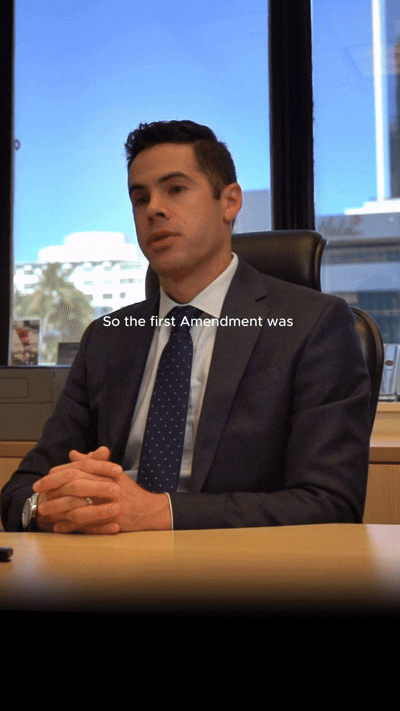Amendments to Florida Rules Of Civil Procedure
What every litigator needs to know about Florida’s procedural rule changes.
INTRO
Florida Civil Rules: What’s Changed
The Florida Supreme Court has implemented significant amendments to the Rules of Civil Procedure that will affect civil litigation practice throughout the state. This analysis, prepared by Partner Russell Landy, delivers an in-depth analysis of the changes, highlighting their practical impact on attorneys and litigants. Learn how the new rules influence litigation strategy, case management, and procedural compliance—so you can effectively advise and represent clients under the updated framework.

OVERVIEW
Overview of Amendment Decisions

Supreme Court Decisions
Total number of amendment decisions issued by the Florida Supreme Court affecting civil procedure rules

Rules Affected
Number of civil procedure rules modified or created by these decisions

Effective Dates
Separate implementation dates for different rule changes (July 1, 2024 and January 1, 2025)
YOUTUBE
Watch Video Series on YouTube
Watch our short video series on YouTube, where Partner Russell Landy walks through the key amendments to the Florida Rules of Civil Procedure. Each clip breaks down a specific rule change and its impact on litigation practice.
Click on the button below to visit our YouTube channel and watch the full series. An episode will be released weekly.
Three Amendments Decisions
, AMENDMENTS
In re: Amendments to the Florida Rules of Civil Procedure, SC2022-17, 2024 WL 2858716 (Fla. June 6, 2024) Effective: July 1, 2024
Rule 1.110(d) – Affirmative Defenses
Imposes new pleading requirements for affirmative defenses, requiring attorneys to provide a “short and plain statement of the ultimate facts” supporting each defense.
Rule 1.820(h) – Arbitration Decisions
Revises procedures for rejecting non-binding arbitration decisions, clarifying that only the filing of a specific notice of rejection will be deemed a rejection of an arbitration decision.
Forms 1.923(a), 1.923(b), and 1.947(b)
Updates to landlord-tenant forms to conform with recent statutory changes and ensure proper notice requirements are met in residential and non-residential eviction proceedings.
, AMENDMENTS
In re: Amendments to the Florida Rules of Civil Procedure, SC2023-0962, 2024 WL 2341793 (Fla. May 23, 2024) Effective: January 1, 2025
Rule 1.200 – Case Management
Comprehensive revisions to pretrial procedure, including mandatory case management conferences and differentiated case tracks based on complexity.
Rule 1.201 – Complex Litigation
Modified criteria for complex case designation and specialized management procedures for these matters.
Rule 1.1280 – Discovery
Updated general provisions governing discovery to align with case management protocols and encourage proportionality.
Rules 1.440 & 1.460 – Trial Setting
Revised procedures for setting cases for trial and standards for motions to continue, with stricter requirements for postponements.
, AMENDMENTS
In re: Amendments to the Florida Rules of Civil Procedure, SC2023-0962, 2024 WL 2341793 (Fla. May 23, 2024) Effective: January 1, 2025
NEW Rule 1.202 – Conferral Prior to Filing Motions
Establishes mandatory conferral obligations prior to filing virtually all motions in civil cases. Attorneys must certify good faith efforts to resolve issues without court intervention.
Rule 1.510 Revisions – Summary Judgment
Further refines the summary judgment standard previously aligned with the federal approach, with particular emphasis on procedural requirements and standards for determining genuine disputes of material fact.*
*Oral Argument – 11/7/24
Note that oral argument on the summary judgment held on November 7, 2024, which resulted in further modifications.
December 5, 2024 Amendment
Case Management Rule 1.200
RULE 1.200
Exemptions to Requirement for Case Management under Rule 1.200
The extensively revised Rule 1.200, effective January 1, 2025, represents perhaps the most significant change to Florida civil procedure in decades. It institutes a comprehensive case management system similar to the federal model, with differentiated case tracks, mandatory conferences, and detailed scheduling orders. These changes will require attorneys to prepare more thoroughly for early case events and adhere strictly to court-imposed deadlines.
1.200(a) lists exemptions, including:
- Section 51.011 summary proceedings
- Section 45.075 expedited trials
- Small claims matters
- Eminent domain matters
- Enforcing arbitration awards
- An action or proceeding under chapters 731-736, 738, and 744, FS
- Extraordinary writs; Enforcing foreign judgments
- Special division matters (e.g., complex division)
- Others
Rule 1.200: Rewritten to create new obligations
- Deadline of 120 days or 30 days after service on last Defendant to enter case management order.
- Actual or projected trial date (3 tracks)
- Strict enforcement of deadlines.
- Required to file motion to change track
– Promptly after appearance of good cause - Sua sponte
- But “[p]arties may submit an agreed order to extend a deadline if the extension does not affect the ability to comply with the remaining dates” in the CMO.
- If extension may affect other CMO dates, “parties must seek an amendment” of the CMO.
- Rule 1.200(e)(2): Once set (not merely projected), trial period can be changed only if requirements of the new version of Rule 1.460 are satisfied.
Case Management Order
-
(A) service of complaints;
-
(B) service under extensions;
-
(C) adding new parties;
-
(D) completion of fact discovery;
-
(E) completion of expert discovery;
-
(F) filing and service of motions for summary judgment;
-
(G) filing and resolution of all objections to pleadings;
-
(H) filing and resolution of all pretrial motions;
-
(I) completion of alternative dispute resolution.
- 1.200(e)(3): Motion to extend a deadline, amend a CMO, or alter a projected trial period must specify:
(a) basis of need for extension and when basis became known to movant; (b) whether motion is opposed; (c) specific new date requested and whether all parties agree to that date; (d) the action and specific dates for the action that will enable movant to meet the proposed new deadline / projected trial period.
-
Rules 1.200(f), (g): Notices of Unavailability have no effect on case management deadlines. If a party can’t meet a deadline, file an agreed order (if the extension does not affect other deadlines 1.200(e)(1)), ask to modify CMO, or set a CMC.
-
Rule 1.200(h): If trial not reached, court must enter order setting new trial period as soon as practicable; order must reflect what further activity is and is not permitted.
Rule 1.200(j) – Case Management Conferences
-
Court or party may set CMC.
-
If set by party, notice must identify specific issues to be addressed & list pending motions.
-
Court may, with reasonable notice to the parties, hear all motions except SJ or evidentiary, even if parties have not requested.;
-
Any hearing may be converted to a CMC by agreement of the parties at time of hearing.
-
At end of CMC, Court must set deadlines for any proposed orders arising out of the CMC.
-
Sanctions for nonappearance at CMC.
- Case management orders already in effect on January 1, 2025, continue to govern pending actions.
-
For actions commenced before January 1, 2025, and in which the court has not issued a case management order by that date, a case management order must be issued by April 4, 2025.
Meet and Confer Rule 1.202
RULE 1.202
Rule 1.202 – Conferral Prior to Filing Motions
Scope of Application
- Requiring good faith conferral between counsel prior to filing.
- The certificate of conferral must appear above the signature block with specific allegations of conferral efforts.
Exemptions & Sanctions
- Conferral NOT required for: unrepresented litigants, nor for motions extending service of process, default, injunctive relief, judgment on pleadings, summary judgment, motion to dismiss for failure to state a claim, to permit class action, involuntary dismissal, directed verdict and 1.530, enforcement of judgment, writs of possession…
- Sanctions may include denial without prejudice and penalties for purposeful evasion.
RULE 1.201
Rule 1.201 – Complex Litigation
Optional Hearings
-
Amendment allows (but does not require) hearings to determine whether a case should be designated as complex.
Continuances
-
Provide that motions for trial continuance are governed by Rule 1.460.
Notification Requirements
-
Adds obligation for parties to “notify the court immediately if a case management conference or hearing time becomes unnecessary.”
Expediated Orders
-
Requires case management orders to be entered within ten days after the initial case management conference, accelerating procedural timelines.
Discovery
DISCOVERY
Initial Discovery Disclosures Requirements
1.280(a)(1): Initial Discovery Disclosures
-
Amendment allows (but does not require) hearings to determine whether a case should be designated as complex.
1.280(a)(3): Disclosure Timing
-
Requires initial disclosures within 60 days after service unless court orders otherwise.
1.280(a)(4): Disclosure Basis
-
Mandates disclosures based on reasonably available information; incomplete investigation is not an excuse
Exemptions
-
Rule 1.200(a)(2) provides identical exemptions as in Rule 1.200(a).
1.280(f): Disclosure Restrictions
-
Prohibits seeking discovery before satisfying initial disclosure obligations, unless authorized by stipulation or court order
DISCOVERY
Scope of Discovery; Proportionality
Rule 1.280 (c)(1): Party may obtain any non privileged matter
Non-Privileged
-
Only non-privileged matter is discoverable
Relevant
-
Must be relevant to the claims and defenses
Proportional to the Needs of the Case
-
Considering the importance of issues, amount in controversy, parties’ relative access, and resources
Exemptions
-
Rule 1.200(a)(2) provides identical exemptions as in Rule 1.200(a).
Cost_benefit Analysis
-
Discovery burden or expense must not outweigh likely benefit
Commentary adopts almost all of Federal Rule 26(b)(1); Rule to be construed and applied in accordance with federal standard.
DISCOVERY
Supportive Amendments to Discovery Rules
Interrogatory Objections
-
Rule 1.340(a)(8) requires specific objection grounds with reasons
-
Untimely objections are waived absent good cause
Partial Objections
-
Objections to part of a request must specify the objectionable portion
-
Must permit inspection of non-objectionable portions
Production Objections
-
Rules 1.350(a)(4) and (5) mandate specific objection grounds with reasons
-
Rule 1.350(a)(6) requires stating whether responsive material is being withheld
Sanctions
-
Rule 1.380 expands sanctions for failure to respond or produce
-
Creates significant consequences for non-compliances
DISCOVERY
Protective Orders and Supplementation
1.280 (d)(2): Protective Order Cost Allocation
Now explicitly authorizes courts to allocate expenses when issuing protective orders.
This provision gives courts greater flexibility in fashioning equitable protective orders and may deter unreasonable discovery requests by imposing financial consequences on the requesting party.
1.280 (g): Supplementing Responses
Creates an affirmative duty to supplement or correct discovery responses under specific circumstances:
- When new information becomes available
- When the responding party learns prior responses were incorrect
- When ordered by the court
Supplementation must be timely, particularly when the opposing party would not otherwise know about the new information.
DISCOVERY
Signing Requirements and Certification
Signature Requirement
Rule 1.280(k) mandates at least one attorney of record or self-represented litigant must sign all disclosures, requests, responses, and objections.
December 2024 Amendment
Violations without substantial justification will result in sanctions on signer, party, or both, including reasonable expenses and attorney’s fees
Certification Standard
Signature constitutes certification that the document is complete, correct, consistent with rules and law, in good faith, and not unreasonable or unduly burdensome
Unsigned Documents
No party has a duty to act on an unsigned disclosure, request, response, or objection
DISCOVERY
1.380 – Sanctions For Failure to Make Discovery
December Amendment 1.380(d)
If a party fails to provide information or identify a witness as required by rule 1.280(a) or (g), the party is not allowed to use that information or witness to supply evidence on a motion, at a hearing, or at a trial, unless the failure was substantially justified or is harmless. In addition to or instead of this sanction, the court, on motion and after giving an opportunity to be heard:
-
(1) may order payment of the reasonable expenses, including attorneys’ fees, caused by the failure;
-
(2) may inform the jury of the party’s failure; and
-
(3) may impose other appropriate sanctions, including any of the orders listed in rule 1.380(b)(2)(A)–(b)(2)(D)
Rule 1.440 –
Setting Action For Trial
RULE 1.440
1.440 – Setting Action For Trial
(a) Eliminates “At Issue” Requirement
-
“[T]he failure of the pleadings to be closed will not preclude the court from setting a case for trial.”
(b) Motion for Trial Instead of Notice For Trial
-
If a party wants trial set sooner than date in Case Management Order.
(c) Defaulted Parties
-
Trial order must serve defaulted parties for unliquidated damages actions.
(c) Trial Period Setting
-
(1) If court finds action ready earlier than “trial ready” date in CMO, it may enter order setting for earlier trial date.
-
(2) For cases with a projected trial period, no later than 45 days before the projected trial period, the court must enter an order fixing the trial period.
-
(4) 30 days’ notice unless agreed otherwise
Rule 1.460 –
Motions to Continue Trial
DISCOVERY
NEW Rule 1.460 – Motions to Continue Trial
Standard For Granting
(a) Continuances are “Disfavored and should be rarely granted.” Only for good cause. Successive continuances “highly disfavored.” Parental leave subject to Florida Rule of General Practice and Judicial Administration 2.570..
Motion Requirements
(b) In writing (unless made at trial) and signed by moving party.
Timing Considerations
(c) Filed promptly after appearance of good cause. Failure to promptly request is basis to deny continuance.
RULE 1.460(d)
Rule 1.460(d) – Motion To Continue; Contents
Basis and Timeline
Motion must specify the basis for continuance and when that basis became known to the movant.
Action Plan and Proposed Dates
Movant must outline specific actions and dates that will enable readiness for trial by the proposed date, along with the suggested new trial date and whether all parties consent to this timeline.
Position of Opposing Parties
The motion must clearly state whether it is opposed by other parties.
Conferral Documentation
If prior conferral was not possible, the motion must explain dates and methods of attempted conferral efforts. Failure to document conferral attempts may result in sanctions.
RULE 1.460
Rule 1.460 – Motions to Continue Trial
1.460(e): Judicial Responsibility
Judges should avoid continuances by “us[ing] all appropriate methods to address the issues causing delay ….”
1.460(g): Dilatory Conduct
If continuance based on “dilatory conduct” of an attorney or party, court may impose sanctions on attorney, party, or both.
1.460(f): Collaborative Rescheduling
“When possible, continued trial dates must be set in collaboration with attorneys and self-represented litigants ….”
1.460(h): Documentation
Court must state on the record or in written order the factual basis for ruling on motion to continue. Order granting must either set CMC or new trial period “for the earliest date practicable” and must reflect what further activity is and is not permitted.
Summary Judgment
RULE 1.5110
Rule 1.510 – Summary Judgement
(b) Service Deadlines
Consistent with any court ordered deadline. Set by Case Management Order
(c)(5) Response and Factual Position
Consistent with any court ordered deadline. Set by Case Management Order
(c)(6) Hearing Timing
Timing for Hearing. “10 days after the deadline for serving a response, unless the parties stipulate or the court orders otherwise.”
Download PDF Presentation
Get access to the full PDF presentation prepared by Partner Russell Landy for a detailed breakdown of the amendments.

Schedule A Consultation
Have a case that requires our expertise? Contact us today to speak with an attorney.
1000 Brickell Avenue,
Suite 1020
Miami, Florida 33131
P: 305.371.3960
F: 305.371.3965

